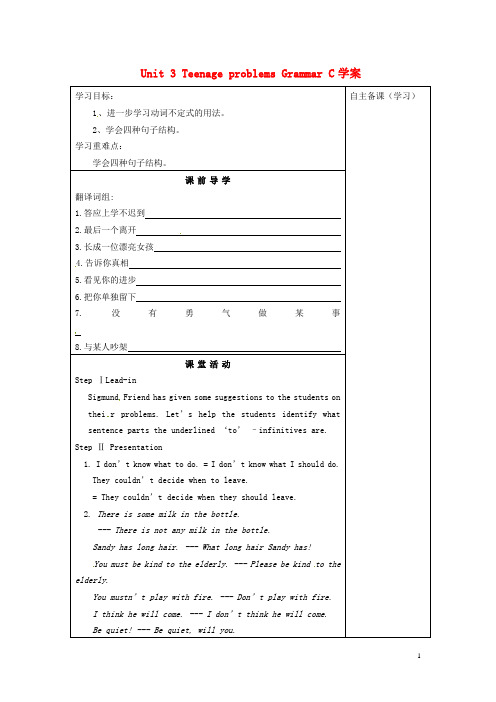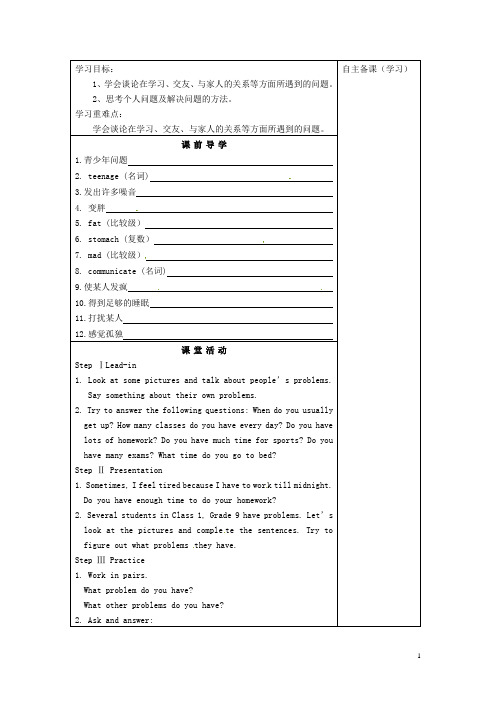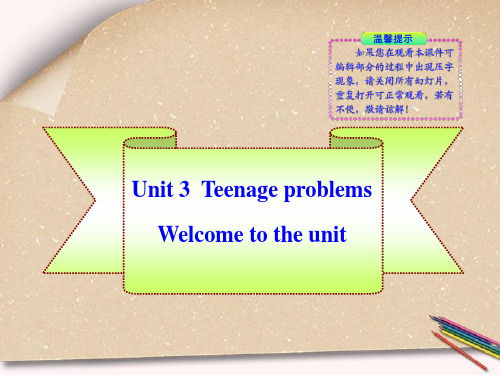江苏省南京市金陵中学河西分校九年级英语上册 Unit 3 Teenage problems Inte
江苏省九年级英语上册《Unit3Teenageproblems》课件Integratedskills

Expressing feelings
1. I feel angry/sad/worried/upset when…
2. I feel like…
3. I have a problem. 4. I’m worried about…
Asking for help
1. Can you give me some advice? 2. What do you think? 3. Can you help me? 4. What should I do?
Sue Wang My English name is Sue. I am a Grade 9 student and I am very clever. I love English, Maths and Science. I study hard and I always do well in exams. I am the top student in my class. However, I am not very good at sport. I cannot Sport. I cannot run fast and I hate swimming.
1. How many problems does Sue have? 2. What’s her first problem? 3. What advice did Sigmund Friend give her? 4. What’s her second problem? 5. What advice did Sigmund Friend give her?
Second problem: Not have many ________ friends ----classmates ________ laugh at her and call her a bookworm Advice: Talk to your __________ best friend when feeling sad and share your problems ________ with her; _______ Pay no attention to those students be proud of your who laugh at you and ___________ schoolwork
【VIP专享】江苏省南京市金陵中学河西分校九年级英语上册《Unit 3 teenage problems》单元综合测试题

《Unit 3 teenage problems》单元综合测试题一、选择填空(每小题1分,共15分)1. The teacher told her students ___________ in her class.A. to not whisperB. not whisperC. never to whisperD. didn’t whisper2. We had no choice but ____________ such a snowy day.A. walk onB. walk inC. to walk onD. to walk in3. This piece of music is worth __________.A. to listenB. to listen toC. listeningD. listening to4. Read English every day, ?A. shall weB. won’t youC. do youD. will you5.—Thank you for your advice.—__________.A. It’s all right.B. All rightC. Never mindD. My pleasure6. I am worried and I can’t sleep well at night.A. Really ? So bad.B. I’m sorry to hear that.C. What’s wrong with you?D. Maybe you worry too much.7. Can you hear someone _____in the next door?A. cryB. to cryC. cryingD. cries.8. —Can you follow me?— Sorry, I can ______ follow you. You speak too fast.A. hardlyB. nearlyC. clearlyD. probably9. —When shall we go to the museum, this afternoon or tomorrow morning?—______ is OK. I’m free these days.A. BothB. AllC. EitherD. Neither10. ________ weather it is! Let’s go out for a picnic.A. What goodB. What bad C How good D. How bad11. — You won’t stay out too late today, will you?—__________. I’m too tired and I’ll go to bed early.A. Yes, I won’t.B. No, I won’tC. No, I willD. Yes, I do12. I advise you to be more polite. The ‘to’ – infinitive is _______.A. object complementB. predicativeC. attributiveD. adverbial13. Bob doesn’t know _____ to write about.A. howB. thatC. whatD. where14. The workers were made _____ the whole day.A. workB. to workC. workedD. working15. He came to school on time, _______ he hurt badly his leg.A. becauseB. howeverC. thoughD. but二、完形填空(每小题1分,共15分)Do you often think of your parents? You may say, “Of course, I 16 . I buy a present for my mother on Mother’s Day and on Father’s day I give my father 17 , too.” But what about the other days of the year?I have a friend whose parents live in another city. One day I went to see her. We had a nice talk. Then she wanted to 18 . So she dialed the number, but then she put down the phone. After about fifteen 19 , she dialed the number again, “Hi, Mom …”Later I asked, “ 20 did you dial the number twice?” She smiled, “My parents are old and 21 . They can’t get close to the telephone quickly. I always do so when I call them.I just want to give them 22 time to answer the call. ”My friend is a good girl. She is 23 thinking about her parents. You also want to be a 24 child, right? Please remember to 25 your parents in every situation, not just onsome important days.16. A. do B. will C. won’t D. don’t17. A. a cake B. a kiss C. a present D. some money18. A. have a rest B. make a call C. pay a visit D. go for a walk19. A. hours B. minutes C. seconds D. days20. A. Why B. What C. How D. When21. A. fast B. careless C. healthy D. slow22. A. enough B. quick C. no D. little23. A. never B. always C. seldom D. sometimes24. A. bad B. clever C. sick D. good25. A. protect B. look after C. think of D. listen to三、阅读理解(每小题1分,共15分)ASometimes people come into your life and you know at once that they were sure to be there. They serve some sort of purpose, teach you a lesson or help find out who you are or who you want to become. You never know who these people may be: your classmate, neighbour, teacher, long-lost friend or even a real stranger. But you know that every moment they will affect (影响) your life in some serious way.Sometimes things happen to you. At the time they may seem terri ble, painful (痛苦的) and unfair. But later you realize that without getting over those difficulties you would have never realized your further ability and strength. Everything happens for a reason and nothing happens by chance or with good or bad luck.The people you meet affect your life, and the successes and failure (失败) you experience, create who you are. Even the bad experiences can be learned from. In fact, they are probably the most poignant and important ones.Enjoy every day even every moment and take from it everything that you possibly can, for you may never be able to experience it again. Talk to people you have never talked to before, and really listen. You should set your sights high, hold your head up, tell yourself you are a great one and believe in yourself.You can make your life anything you wish. Create your own life and then go out and live it.26. The people we meet _______.A. all know where to find usB. serve us on no purposeC. won't become our neighborD. will change us in some way27. From the passage, we know that bad things can make us _______.A. terribly meet bad luckB. realize our further abilityC. find no serious successD. possibly enjoy every moment28. The underlined word "poignant" in the passage means "_______ ".A. 平淡的B. 明显的C. 深刻的D. 艰苦的29. The writer's advice is that we should _______.A. never talk to strange peopleB. learn as much as we can each dayC. get over difficulties painfullyD. not believe in ourselves but others30. Which is the best title for the passage?A. Create Your Own LifeB. Hold Your Head UpC. People You Meet in LifeD. Things Happen to YouBEveryone has got two personalities (性格) — the one that is shown to the world and the o ther that is secret and real. You don't show your secret personality when you're awake becaus e you can control yourself, but when you're asleep, your sleeping position shows the real you. In a normal night, of course, you often change your sleeping positions. The important position that best shows your secret personality is the one that you go to sleep.If you go to sleep on your back, you're a very open person. You normally trust people and you are easily influenced by new ideas. You don't like to make people unhappy, so you never express your real feelings. You're quite shy and you aren't very confident.If you sleep on your stomach, you are a person who likes to keep secrets. You worry a lot and you're always easily becoming sad. You never want to change your ideas, but you are satisfied with your life the way it is. You usually live for today not for tomorrow.If you sleep on curled up (蜷缩), you are probably a very nervous person. You have a low opinion of yourself and often protect yourself from being hurt, so you are very defensive. You're shy and you don't usually like meeting people. You like to be on your own.If you sleep on your side, you have usually got a well-balanced (平衡的) personality. You know your strengths and weaknesses. You're usually careful. You have a confident personality. You sometimes feel worried, but you don't often get unhappy. You always say what you think, even if it makes people angry.31. You may find the passage in________.A. a science magazineB. a guide bookC. a sports newspaperD. a story book32. When does the sleeping position best show your secret personality?A. In the daytime.B. At the beginning of sleep.C. At night.D. During the deep sleep.33. Tina hardly tells her secrets to her friends. She probably goes to sleep _____.A. on curled upB. on her stomachC. on her backD. on her side34. What does the word "defensive" mean in the passage?A. 易怒的B. 攻击性的C.外向的D.有戒心的35. What does the passage tell us?A. Sleeping on your side is the best way of sleeping.B. Changing positions will cause sleeping problems.C. Sleeping positions show people's secret personalities.D. Enough sleep makes people look better and healthier.四、语言基础知识(35分)A)根据括号中所给的汉语写单词,使句子意思完整。
江苏省南京市金陵中学河西分校九年级英语上册《Unit 3 teenage problems》课件 牛津版

Brain storm
‘To’- infinitives can also be used after ‘Wh-’ words except ‘Why’
什么 哪一个 什么时候 哪儿 谁 怎样
What Which When 'To'-infinitives Where Who How 疑问代词 what which who whose 疑问副词 when where how
1)The old lady found out where she could buy fruit cheaply. where ___ to _____ buy fruit cheaply. The old lady found out______
2)She has told me what I should do and what I shouldn’t d what ___ to ___ do and what not to ___ do She has told me ____ ___ __ 3)Have you decided which dress you will take? which to ______ take ? Have you decided _______ dress ___
when to play (玩). ____________
who to talk to (和谁交流) for advice. 6. Peter knows _____________ how to get 7.Please tell me ____________ (怎样得到) help.
A game
enough sleep good marks
1. ---What do you think of the school? ----It is a very good _____. A. studying school B. school for children to study C. school to study in D. school to study 2.___ a living, she had to work from morning till night. A. To make B. Made C. Making D. To have made
江苏省南京市金陵中学河西分校九年级英语上册 Unit 3 Teenage problems Grammar C学案(无答案) 牛津版

Unit 3 Teenage problems Grammar C学案学习目标:自主备课(学习)1、进一步学习动词不定式的用法。
2、学会四种句子结构。
学习重难点:学会四种句子结构。
课前导学翻译词组:1.答应上学不迟到2.最后一个离开3.长成一位漂亮女孩4.告诉你真相5.看见你的进步6.把你单独留下7.没有勇气做某事8.与某人吵架课堂活动Step ⅠLead-inSigmund Friend has given some suggestions to the students onthei r problems. Let’s help the students identify whatsentence parts the underlined ‘to’ –infinitives are.St ep Ⅱ Presentation1. I don’t know what to do. = I don’t know what I should do.They couldn’t decide when to leave.= They couldn’t decide when they should leave.2. There is some milk in the bottle.--- There is not any milk in the bottle.Sandy has long hair. --- What long hair Sandy has!You must be kind to the elderly. --- Please be kind to theelderly.You mustn’t play with fire. --- Don’t play with fire.I think he will come. --- I don’t think he will come.Be quiet! --- Be quiet, will you.You dislike this kind of books. --- You dislike this kind of books, don’t you?He works very hard. --- How hard he works!Step Ⅲ PracticeMillie is interviewing Sigmund Friend for the school newsletter. Please complete their c onversation with the correct ‘wh-’ words and ‘to’ –infinitives.课堂反馈一、判断下列句子的类型,并将序号填入题前括号内。
江苏省南京市金陵中学河西分校九年级英语上册 Unit 3 Teenage problems Spea

自主备课(学习)学习目标:1、学会谈论个人问题及提供建议。
2、了解常见的语法错误。
学习重难点:学会谈论个人问题及提供建议。
课前导学翻译词组:1.回复我最近的三封邮件________________2.谢谢你给我建议 ________________________3.太过于担心______________ ________4.发送一张电子卡片______________________5.受压力之苦_______________________6.健康饮食________________________________7.让他知道你多想念他____________________8.在学习方面有难题___________________9.一些处理压力的方法____ _______10.帮助他们放松__________________________课堂活动Step ⅠLead-inMillie is worried these days because h er penfriend in the U SAhasn’t replied to her. She asks Amy for help.Step Ⅱ PresentationListen to the tape and answer the following questions:Who is having a problem?What is her problem?Does Amy agree that Millie’s penfriend doesn’t want to write to her any more?Does Amy thin Millie’s penfriend is too busy to write e-mails?What advice does Amy give Millie?Do you think Millie feels better after discussing her problem with Amy?Step Ⅲ PracticeWork in pairs and make their own dialogue.课堂反馈一、根据中文提示写出单词。
江苏省南京市金陵中学河西分校九年级英语上册 Unit 3 Teenage problems Welc

自主备课(学习)学习目标:1、学会谈论在学习、交友、与家人的关系等方面所遇到的问题。
2、思考个人问题及解决问题的方法。
学习重难点:学会谈论在学习、交友、与家人的关系等方面所遇到的问题。
课前导学1.青少年问题2. teenage (名词)3.发出许多噪音4. 变胖5. fat (比较级)6. stomach (复数)7. mad (比较级)8. communicate (名词)9.使某人发疯10.得到足够的睡眠11.打扰某人12.感觉孤独课堂活动Step ⅠLead-in1. Look at some pictures and talk about people’s problems.Say something about their own problems.2. Try to answer the following questions: When do you usuallyget up? How many classes do you have every day? Do you havelots of homework? Do you have much time for sports? Do youhave many exams? What time do you go to bed?Step Ⅱ Presentation1. Sometimes, I feel tired because I have to wor k till midnight.Do you have enough time to do your homework?2. Several students in Class 1, Grade 9 have problems. Let’slook at the pictures and comple te the sentences. Try tofigure out what problems they have.Step Ⅲ Practice1. Work in pairs.What problem do you have?What other problems do you have?2. Ask and answer:How many of you have too many tests and exams?How many of you don’t take enough exercise?课堂反馈一、根据中文提示填写单词。
九年级英语上册《Unit 3 Teenage problems》Welcome to the unit同步授课课件 牛津译林版

What problems do you have?
Have a competition
Group A
Group B
problems
advice
Work in groups of four.
students problems
A
…
B
…
C
…
D
…
advice
… … … … … … … … … … … …
It’s 6.30 p.m.
The _T__V_ is on while she __is_d_o_i_n_g_her homework. It’s too __n_o_i_sy__. The noise almost drives _h_er sister m__a_k_e_s a lot of n__o_is_e_ and always disturbs her _w_h_e_n__she is studying.
My parents haven’t come back. They are busy with their work. They don’t have time for me. I have to look after myself. I seldom communicate with them.
Unit 3 Teenage problems Welcome to the unit
1.What’s Eddie’s problem? He’s getting fat.
2.What advice does Hobo give to him? Hobo advised Eddie not to eat too much, but to try more exercise.
江苏新教材九年级上 Unit 3 Teenage problems Welcome to the unit

Good, I’ll finish the food for you then.
预习成果 (一)认真阅读课文,将下列短语翻译成英 语。 1、足够的睡眠 _________________ 2、怎么啦 _________________ 3、有足够的时间做家庭作业 ______________________________ 4、使… 发疯 _________________ 5、电视一直开着 _______________ 6、寻求建议 __________________ 7、没有亲密的朋友 ______________ 8、整天工作 _________________ 9、感到孤单 _________________ 10、青少年问题 _________________
2. 技能目标: 1) 听懂并掌握与teenage problems有关的词语。 2) 能说出在学习和生活中遇到的问题和烦恼,并 给出建议。 3) 掌握提建议的句型。 4) 能就青少年在学习、交友、家庭等方面所遇到 的问题展开讨论。 3. 情感目标:帮助学生正确认识在学习和生活中 遇到的一些困惑和烦恼,培养学生解决问题的能 力,掌握解决问题的方法。
Comic strips
What’s Eddie’s problem? Do you know?
He’s getting fat.
Can you guess why Eddie is getting fat?
Because he eats too much.
Listen to the tape and answer the questions below.
(二) 用所给词的适当形式填空。 1. It’s too _________ (noise) outside. I can’t get to sleep. 2. ___________ (eat) too much is bad for your health. 3. Reading in bed _________ (be) bad for your eyes. 4. Listening and speaking _________(be) important. 5. I don’t know what _________ (do) with the problem.
- 1、下载文档前请自行甄别文档内容的完整性,平台不提供额外的编辑、内容补充、找答案等附加服务。
- 2、"仅部分预览"的文档,不可在线预览部分如存在完整性等问题,可反馈申请退款(可完整预览的文档不适用该条件!)。
- 3、如文档侵犯您的权益,请联系客服反馈,我们会尽快为您处理(人工客服工作时间:9:00-18:30)。
自主备课(学习)学习目标:
1、从一个学生的情况介绍中获得信息并做记录。
2、从对话中获取信息。
学习重难点:
完成一份访问记录。
课前导学
一、完成句子。
1、擅长考试
2、尖子生
3、叫她书呆子
4、嘲笑她
5、跟她分享你的难题
6、不在意…
7、以你的功课自豪
8、她最喜爱的科目
9、讨厌游泳
10、使她觉得伤心
课堂活动
Step ⅠLead-in
Sue is the top student in her class, but she also has some problems.
L et’s see Sue’s profile.
Step Ⅱ Presentation
1. What information shoul d a student’s profile include?
A student’s profile should include his / her name, class, hobby,
the subjects he / she likes best and least, as well as something
about his / her family and friends.
2. Finish pat A1 on page 54.
3. Listen to the tape and finish Sue’s notes on page 5
4.
Step Ⅲ Practice
Work in pairs. Ask and answer the following questions:
Is Sue the top student in her clas s?
What are her favourite subjects?
S he is good at sports, isn’t she?
What is Mr Friend’s advice on Sue’s PE lessons?
We should pay no attention to the people who laugh at us, right?
课堂反馈
一、用所给单词的适当形式填空。
1. The boy does __________ (good) in all the lessons.
2. Tom’s mother is ill in bed. He is __________ (worry) about her.
3. I find Geography ___________ (difficulty) for me.
4. The girl seems much ___________ (happy) than before.
二、用所给动词的适当形式填空。
1. I like eating nice food, but I hate ___ _____ (wash) dishes.
2. The man made his son ______ ___ (paint) the house the whole day.
3. The boy wants _____ _____ (play) ball games with his friends.
4. I’m sorry ____ ______ (tell) you that you failed the exam.
5. Why don’t you _____ ____ (work) h ard at your lessons?
6. Tell her (not pay) any attention to those students
who look down on her.
7. Do you know how ___ _____ (make) a pumpkin lantern?
8. Why not listen to some cheerful music when _______ ___ (feel) sad?
教师评价
教学反思。
